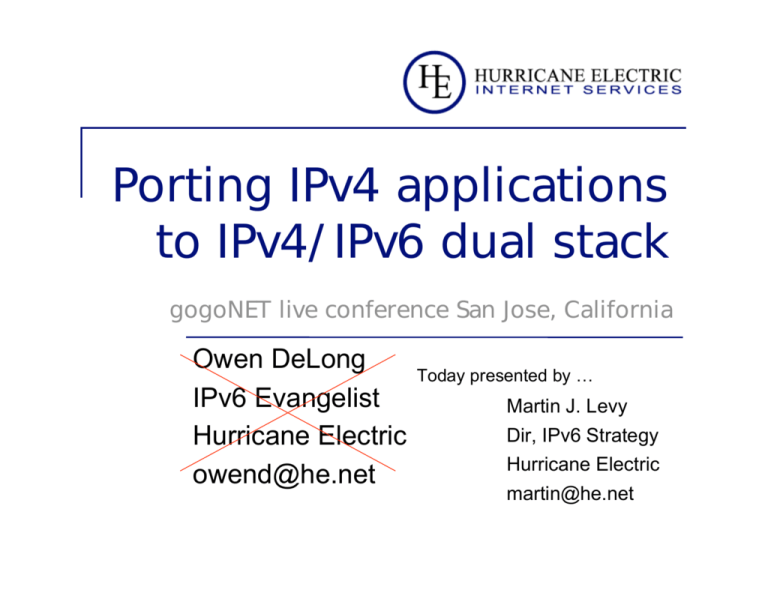
Porting IPv4 applications
to IPv4/IPv6 dual stack
gogoNET live conference San Jose, California
Owen DeLong
IPv6 Evangelist
Hurricane Electric
owend@he.net
Today presented by …
Martin J. Levy
Dir, IPv6 Strategy
Hurricane Electric
martin@he.net
Why is this important?
Now
04 November 2010
Hurricane Electric
Page 2
Apologies in advance for the Text-Fest
Text
Text Text
Text
Text
Text Text
Text
Text
Text
Text
Text
Text TextText Text
Text Text
TextTextText
Text
Text
04 November 2010
Hurricane Electric
Page 3
The core issue for software … size
IPv4
V
L
TOS
Identification
TTL
IPv6
Total Len
Flags
Proto
Frag’ Off
V
Class
Payload Length
Flow Label
Hop
NH
Limit
Checksum
Source Address
Source Address
Destination Address
Options
Pad
typedef __uint32_t in_addr_t;
Destination Address
struct in_addr {
in_addr_t s_addr;
}
struct sockaddr_in {
__uint8_t
sin_len;
sa_family_t
sin_family;
in_port_t
sin_port;
struct in_addr sin_addr;
char
sin_zero[8];
};
04 November 2010
struct in6_addr {
union {
__uint8_t
__u6_addr8[16];
__uint16_t __u6_addr16[8];
__uint32_t __u6_addr32[4];
} __u6_addr; /* 128-bit IP6 address */
};
Hurricane Electric
Page 4
Summary of Porting Steps
Sample code available at:
http://owend.corp.he.net/ipv6/sample_application/
Change variable names when changing types
(e.g. dest_sin dest6_sin)
Look for old variable name(s) as markers for
code to be updated.
Classic software development issues:
Compile Repair Recompile (iterative)
Test Debug Retest (iterative)
04 November 2010
Hurricane Electric
Page 5
General Changes (IPv4 to dual stack)
First steps:
AF_INET AF_INET6
sockaddr_in sockaddr_in6
sockaddr_in sockaddr_storage ***
Same structure members, similar constants,
mostly just the address size changes.
If necessary, check address scoping
Link-local ( fe80::/64 ) vs. global
Interface scope for link-local addresses
*** RFC2553 defined generic storage type
04 November 2010
Hurricane Electric
Page 6
The sockaddr_in6 structure
struct in6_addr {
union {
__uint8_t
__u6_addr8[16];
__uint16_t __u6_addr16[8];
__uint32_t __u6_addr32[4];
} __u6_addr; /* 128-bit IP6 address */
};
struct sockaddr_in6 {
__uint8_t
sin6_len;
sa_family_t
sin6_family;
in_port_t
sin6_port;
__uint32_t
sin6_flowinfo;
struct in6_addr sin6_addr;
__uint32_t
sin6_scope_id;
};
/*
/*
/*
/*
/*
/*
length of this struct(sa_family_t)*/
AF_INET6 (sa_family_t) */
Transport layer port # (in_port_t)*/
IP6 flow information */
IP6 address */
scope zone index */
Space for 128 bits
04 November 2010
Hurricane Electric
Page 7
Some possible gotchas not covered in the
examples
IP addresses in logs
IP addresses stored in databases
Parsing IP addresses
or other routines that deal with IP addresses
use library functions if at all possible
UDP/ICMP
Link-local scope & interface identifiers (IIDs)
Implementation differences in IPV6_V6ONLY
socket option defaults/availability
04 November 2010
Hurricane Electric
Page 8
C porting example
Refer to the source code examples
By renaming affected variables
v4_* are IPv4 only code
v6_* are same applications ported to dual stack
most calls that need to be updated are
automatically flagged (markers)
Sample code available at:
http://owend.corp.he.net/ipv6/sample_application/
04 November 2010
Hurricane Electric
Page 9
Migrating the server (C)
The easy part:
Additional #include <netinet/in.h>
Rename sockfd sockfd6 (optional)
Change sockaddr_in sockaddr_in6 (new struct)
and rename as dest_sin6 (marker)
Update initializations of dest_sin6 (new members)
Change args in socket() call
Socket related error messages (variable renaming)
Update setsockopt(), bind(), listen(), etc
(variable renaming)
04 November 2010
Hurricane Electric
Page 10
Migrating the server (C)
The easy part (cont’d):
Update preparation for select() (variable
renaming)
Update initialization of socklen
Update call to accept() (renaming)
Other miscellaneous variable renaming
inet_ntoa() inet_ntop()
04 November 2010
Hurricane Electric
Page 11
Migrating the client (C)
Similar to porting the server...
The less easy parts
Need a helper function (get_ip_str() ***) to front
inet_ntop() for different possible return structures
from getaddrinfo()
replacing gethostbyname() / getservbyname()
with getaddrinfo() requires some effort. The
getaddrinfo() process is actually MUCH cleaner.
(newer v4-only code may already use getaddrinfo() )
Remember to free memory allocated by getaddrinfo()
*** search for get_ip_str code online
04 November 2010
Hurricane Electric
Page 12
Warning: Eye Charts ahead
A handout with side-by side diffs of the
source code is available at:
http://owend.corp.he.net/ipv6/
I
FY
OUCAN
READT
HISYO
UREYE
SAREBET
TERTHANMINE
Copyright ©2009 Hurricane Electric, All Rights Reserved
04 November 2010
Hurricane Electric
Page 13
More detail on the hard parts (C)
IPv4 Only (gethostbyname):
/* Try as host name */
if (host_ent = gethostbyname(argv[1])) {
dest_sin.sin_family = host_ent->h_addrtype;
if (host_ent->h_length > sizeof( dest_sin.sin_addr)) {
fprintf(stderr, "%s: address length wrong.\n", argv[0]);
exit(2);
}
memcpy(&dest_sin.sin_addr, host_ent->h_addr_list[0], host_ent->h_length);
} else {
/* Try as IP address */
if (dest_sin.sin_addr.s_addr = inet_addr(argv[1])) {
fprintf(stderr, "%s: cannot find address for '%s'.\n", argv[0], argv[1]);
exit(2);
}
04 November 2010
Hurricane Electric
Page 14
More detail on the hard parts (C) (cont’d)
IPv4 Only (getservbyname):
/* Get service information */
if ((srvp = getservbyname("demo", "tcp")) == 0) {
fprintf(stderr, "%s: cannot find port number for demo service.\n", argv[0]);
exit(3);
} else {
dest_sin.sin_port = srvp->s_port;
}
04 November 2010
Hurricane Electric
Page 15
More detail on the hard parts (C) (cont’d)
IPv4/v6 Dual Stack (getaddrinfo()) does
both:
Gets both Service and Host information at once.
Returns a dynamically allocated linked list
Don’t forget to free the list when you no longer need it.
/* Get address info for specified host and demo service */
memset(&addrinfo, 0, sizeof(addrinfo));
addrinfo.ai_family = PF_UNSPEC;
addrinfo.ai_socktype = SOCK_STREAM;
addrinfo.ai_protocol = IPPROTO_TCP;
if (rval = getaddrinfo(argv[1], "demo", &addrinfo, &res) != 0) {
fprintf(stderr, "%s: Failed to resolve address information.\n", argv[0]);
exit(2);
}
04 November 2010
Hurricane Electric
Page 16
Trying to connect -- Dierences (C)
IPv4 Only (see example source code):
for (addrlist = host_ent->h_addr_list; *addrlist != NULL; addrlist++) {
memcpy((caddr_t)&dest_sin.sin_addr, (caddr_t)*addrlist, sizeof(dest_sin.sin_addr));
if ((sockfd = socket(AF_INET, SOCK_STREAM, IPPROTO_TCP)) < 0) {
fprintf(stderr, "%s: Could not create socket.\n", argv[0]);
exit(4);
}
if (connect(sockfd, (struct sockaddr *)&dest_sin, sizeof(dest_sin)) < 0) {
e_save = errno;
(void) close(sockfd);
errno = e_save;
fprintf(stderr, "%s: Failed attempt to %s.\n", argv[0],
inet_ntoa(dest_sin.sin_addr));
perror("Socket error");
} else {
snprintf(s, BUFLEN, "%s: Succeeded to %s (%d).", argv[0],
inet_ntoa(dest_sin.sin_addr), dest_sin.sin_addr);
debug(5, argv[0], s);
success++;
break;
}
}
if (success == 0) {
fprintf(stderr, "%s: Failed to connect to %s.\n", argv[0], argv[1]);
exit(5);
}
04 November 2010
Hurricane Electric
Page 17
Trying to connect -- Dierences (C)
The new way (a bit easier) see example code
for (r=res; r; r = r->ai_next) {
sockfd6 = socket(r->ai_family, r->ai_socktype, r->ai_protocol);
if (connect(sockfd6, r->ai_addr, r->ai_addrlen) < 0)
{
e_save = errno;
(void) close(sockfd6);
errno = e_save;
fprintf(stderr, "%s: Failed attempt to %s.\n", argv[0],
get_ip_str((struct sockaddr *)r->ai_addr, buf, BUFLEN));
perror("Socket error");
} else {
snprintf(s, BUFLEN, "%s: Succeeded to %s.", argv[0],
get_ip_str((struct sockaddr *)r->ai_addr, buf, BUFLEN));
debug(5, argv[0], s);
success++;
break;
}
}
if (success == 0) {
fprintf(stderr, "%s: Failed to connect to %s.\n", argv[0], argv[1]);
freeaddrinfo(res);
exit(5);
}
printf("%s: Successfully connected to %s at %s on FD %d.\n", argv[0], argv[1],
get_ip_str((struct sockaddr *)r->ai_addr, buf, BUFLEN),
sockfd6);
04 November 2010
Hurricane Electric
Page 18
Migrating the client (C)
The easy parts
Use the same variable name flagging method as
with server.
Mostly update the same structure names and calls,
flagged the same way.
getaddrinfo() will automatically return the AAAA
and A records, so, v6/v4 is automatic with one
codebase.
inet_ntop() needs a helper function
(see get_ip_str() in the example code)
04 November 2010
Hurricane Electric
Page 19
What happens if we aren’t ready?
IPv6 only Clients
04 November 2010
Hurricane Electric
IPv4 Only Server
Page 20
PERL Porting Example
Refer to the Source Code Examples
v4_* are IPv4 only code
v6_* are same applications ported to dual
stack
Did not rename most variables in this
example. (Small codebase, not as important)
04 November 2010
Hurricane Electric
Page 21
Server Dierences (PERL)
Add use Socket6 to the modules “used”
You still need use Socket, too
PERL documentation for Socket6 is
minimal and examples limited
Gut and replace get*byname() calls
more on this next slide
Change protocol and address families in
socket() and bind() calls
Minor changes to processing incoming
connections
mostly related to name/address display
04 November 2010
Hurricane Electric
Page 22
Server Dierences (PERL) (cont.)
Biggest change is conversion from
get*byname() to getaddrinfo()
Similar changes to C port
(same underlying library changes)
C getaddrinfo() returns linked list. PERL
getaddrinfo() returns straight list
(multiple of 5 elements, each 5 elements is
a list entry).
Gotcha on getaddrinfo() -- passing in
in6addr_any does not return in6addr_any.
04 November 2010
Hurricane Electric
Page 23
Code Changes (PERL)
Old way (getservbyname()):
my $tcp = getprotobyname('tcp');
my $tcpport = getservbyname('demo', 'tcp');
New way (getaddrinfo()):
my ($fam, $stype, $tcp, $saddr, $cname);
my @res = getaddrinfo(in6addr_any(), 'demo', AF_UNSPEC, SOCK_STREAM);
my ($tcpport, $addr);
die "$0: Could not get protocol information" unless @res;
# This is ugly, but, seems to be necessary to bind to IPv6.
$fam = 0;
($fam, $stype, $tcp, $saddr, $cname, @res) = @res while $fam != AF_INET6;
die "$0: IPv6 unsupported on this system.\n" unless ($fam == AF_INET6);
($tcpport, $addr) = unpack_sockaddr_in6($saddr);
$addr = in6addr_any();
$saddr = pack_sockaddr_in6($tcpport, $addr);
04 November 2010
Hurricane Electric
Page 24
Code Changes (PERL) (Cont.)
IPv4 only:
socket(TCPServer, PF_INET, SOCK_STREAM, $tcp) ||
die "$0: Could not create socket: $!";
bind(TCPServer, sockaddr_in($tcpport, INADDR_ANY)) || die "$0: Bind failed: $!”;
IPv4/v6 Dual Stack:
socket(TCPServer, PF_INET6, SOCK_STREAM, $tcp) ||
die "$0: Could not create socket: $!";
bind(TCPServer, $saddr) ||
die "$0: Bind failed: $!";
04 November 2010
Hurricane Electric
Page 25
Code Changes (PERL) (Cont.)
IPv4 only:
my ($port, $iaddr) = sockaddr_in($paddr);
my $name = gethostbyaddr($iaddr, AF_INET);
debug(5, "TCP Connection from $name [” .
inet_ntoa($iaddr)
. "] at port $port.\n");
$CLIENTS{$CLIENT} = inet_ntoa($iaddr)."/".$port;
IPv4/v6 Dual Stack:
my ($port, $iaddr) = unpack_sockaddr_in6($paddr);
my ($name, $svc) = getnameinfo($paddr);
debug(5, "TCP Connection from $name [" .
inet_ntop(AF_INET6, $iaddr)
. "] at port $port.\n");
$CLIENTS{$CLIENT} = inet_ntop(AF_INET6, $iaddr)."/".$port;
04 November 2010
Hurricane Electric
Page 26
PERL Client Migration
Similar changes to C client
Add module Socket6 (just like the server)
Rearrange the address resolution stuff for
getaddrinfo()
Add some handling for AF_INET6 to the
connection loop
Convert inet_ntoa() to inet_ntop()
calls.
Handle Protocol Family for socket() call
04 November 2010
Hurricane Electric
Page 27
Code Changes (PERL) (Cont.)
IPv4 only:
my $tcp = getprotobyname('tcp');
my $tcpport = getservbyname($port, 'tcp');
...
my ($name, $aliases, $addrtype, $length, @addrs) = gethostbyname($server);
die("$0: gethostbyname error: $!\n") if ($?);
die("Invalid server specified.\n") unless(@addrs);
socket(SOCKFD, PF_INET, SOCK_STREAM, $tcp) ||
die "Couldn't create socket: $!\n”;
SOCKFD->autoflush(1);
IPv4/v6 Dual Stack:
my @res = getaddrinfo($server, 'demo', AF_UNSPEC, SOCK_STREAM, 'tcp');
die("Could not resolve $server or service demo: ".$res[0].".\n")
unless(scalar(@res) >= 5);
Note: In IPv4, socket can be recycled for multiple
connects. IPv4/v6 Dual Stack, not so due to
possible family change (PF_INET/PF_INET6)
04 November 2010
Hurricane Electric
Page 28
Code Changes (PERL) (Cont.)
IPv4 only:
while (@addrs) {
$a = shift(@addrs);
print "Trying host ", inet_ntoa($a),".\n";
$dest_sin = sockaddr_in($tcpport, $a);
last if(connect(SOCKFD, $dest_sin));
print "Failed to connect to ", inet_ntoa($a), ".\n";
$dest_sin = -1;
}
04 November 2010
Hurricane Electric
Page 29
Code Changes (PERL) (Cont.)
IPv4/v6 Dual Stack:
my ($fam, $stype, $proto, $saddr, $cname);
my ($port, $addr);
while (scalar(@res) >= 5) {
($fam, $stype, $proto, $saddr, $cname, @res) = @res;
next unless($saddr);
$cname = $server unless $cname;
print "Unpacking $cname...";
($port, $addr) = ($fam == AF_INET6) ?
unpack_sockaddr_in6($saddr) : sockaddr_in($saddr);
$addr = inet_ntop($fam, $addr);
print "Trying host $cname ($addr) port $port.\n";
my $PF = ($fam == AF_INET6) ? PF_INET6 : PF_INET;
socket(SOCKFD, $PF, SOCK_STREAM, $proto) || die "Couldn't create socket $!\n";
SOCKFD->autoflush(1);
last if(connect(SOCKFD, $saddr));
close SOCKFD;
print "Failed to connect to $cname ($addr): $!.\n";
$saddr = -1;
}
This isn’t as bad as it looks. Need better libraries?
04 November 2010
Hurricane Electric
Page 30
No, really, what happens?
04 November 2010
Hurricane Electric
Page 31
Python Porting Example
Refer to the Source Code Examples
v4_* are IPv4 only code
v6_* are same applications ported to dual
stack
Did not rename most variables in this
example. (Small codebase, not as important)
04 November 2010
Hurricane Electric
Page 32
Server Dierences (Python)
Gut and replace get*byname() calls
(more on this next slide)
Replace default fatal error for single attempt at
binding with iterative loop to handle multiple
address families
Minor changes to processing incoming
connections (4-tuple instead of 2).
04 November 2010
Hurricane Electric
Page 33
Code Changes (Python)
Old way (getservbyname()):
tcp = socket.getprotobyname('tcp')
tcpport = socket.getservbyname(port, 'tcp')
New way (getaddrinfo()):
try:
res = socket.getaddrinfo(None, "demo", socket.AF_UNSPEC, \
socket.SOCK_STREAM, 0, socket.AI_PASSIVE)
except socket.gaierror, (errno, msg):
print >> sys.stderr, "%s: failed with error %s." \
% (prog, msg)
sys.exit(1)
04 November 2010
Hurricane Electric
Page 34
Listening (Python)
Old way:
s = socket.socket(socket.AF_INET, socket.SOCK_STREAM)
s.setblocking(0)
s.setsockopt(socket.SOL_SOCKET, socket.SO_REUSEADDR, 1)
s.bind(('', tcpport))
s.listen(socket.SOMAXCONN)
New way:
for (fam, stype, proto, cname, saddr) in res:
if (fam is not socket.AF_INET6): continue
(addr, tcpport, flow, scope) = saddr
try:
s = socket.socket(fam, stype, proto)
except socket.error, (errno, msg):
s = None
continue
try:
s.setblocking(0)
s.setsockopt(socket.SOL_SOCKET, socket.SO_REUSEADDR, 1)
s.bind(('', tcpport))
s.listen(socket.SOMAXCONN)
except socket.error, (errno, msg):
s.close()
s = None
continue
break
04 November 2010
Hurricane Electric
Page 35
Code Changes (Python) (Cont.)
Old way:
(host, port) = addr
New way:
(host, port, flow, scope) = addr
Clarification: this is parsing the output from the
accept() call which returns (conn, addr).
As you can see, the IPv6 compatible change is the
additional elements in the returned “addr” tuple.
Used to make the address presentable in
debugging output and user messages.
04 November 2010
Hurricane Electric
Page 36
Python Client Migration
Similar changes to C client
Rearrange the address resolution stuff for
getaddrinfo()
Add some handling for AF_INET6 to the
connection loop
Convert inet_ntoa() to inet_ntop()
calls.
Handle Protocol Family for socket() call
04 November 2010
Hurricane Electric
Page 37
Code Changes (Python)
Old Way:
for i in addrlist:
print "Trying host %s." % I
try:
s.connect((i,tcpport))
except socket.error, (errno, msg):
print "Failed to connect to %s: %s." % (i, msg)
continue
break
else:
print >>sys.stderr, "Connect failed.”
sys.exit(1)
04 November 2010
Hurricane Electric
Page 38
Code Changes (Python) (Cont.)
New Way:
if (fam is socket.AF_INET6):
(host, port, flow, scope) = saddr
elif (fam is socket.AF_INET):
(host, port) = saddr
else:
debug(3, "Skipping unknown address family:", fam)
continue
print "Trying host %s (%s) port %d." % (cname, host, port)
try:
s = socket.socket(fam, stype, proto)
except socket.error, (errno, msg):
s = None
continue
try:
s.connect(saddr)
except socket.error, (errno, msg):
s.close()
s=None
print "Failed to connect to %s (%s): %s." % (cname, host, msg)
continue
if s: break
if s is None:
print >> sys.stderr, "%s: No successful connection." % prog
sys.exit(1)
04 November 2010
Hurricane Electric
Page 39
Connecting (Python) (Cont.)
In addition, there are minor modifications
required in the successful connection
message
(variable names in print arguments).
No other code changes needed in Python.
04 November 2010
Hurricane Electric
Page 40
Function Replacement Guide (all
languages)
Old Function
Current Function
get*by*()
getaddrinfo(), getnameinfo()
socket()
socket()†
bind()
bind()†
listen()
listen()
connect()
connect()†
recv*()
recv*()†
send*()
send*()†
accept()
accept()
read()/write()
read()/write()
inet_ntoa()/inet_aton()
inet_ntop()/net_pton() or getnameinfo()†
† parameters change for IPv6 suport
04 November 2010
Hurricane Electric
Page 41
Structure Replacement Guide
Old Structure
Current Structure
sockaddr_in, sockaddr_storage†
sockaddr_in6, sockaddr_storage†
in_addr, int (Don’t do this, even in v4 only)
hostent
addrinfo
servent
†sockaddr_storage is a pointer type only can point to either actual type.
04 November 2010
Hurricane Electric
Page 42
Client to Server IPv6 interconnections
Clients with IPv6 code; but on an IPv4 network
Code won’t get an IPv6 socket; so IPv4 will be used
Clients with IPv6 code and on an IPv6 network
Maybe the IPv6 address is actually 6to4 or Teredo
Maybe the IPv6 address is real; but no connectivity
IPv4 Client
IPv6 Client
2001::/32
2002::/16
IPv6 Client
IPv4 Server
IPv6 Server
?
6to4 / Teredo Relay
IPv6 Client
04 November 2010
IPv6 Server
IPv6 Server
Hurricane Electric
Page 43
Summary
Well written code can operate on IPv4 & IPv6
Modern languages support IPv6
If the software writer takes care
Database and logging code needs review
Please check out the online examples
04 November 2010
Hurricane Electric
Page 44
Q&A
?
Copy of slides available at:
http://owend.corp.he.net/ipv6/PortMeth.pdf
Contact:
Owen DeLong
IPv6 Evangelist
Hurricane Electric
760 Mission Court
Fremont, CA 94539, USA
http://he.net/
owend at he dot net
+1 (408) 890 7992
04 November 2010
Hurricane Electric
Page 45






